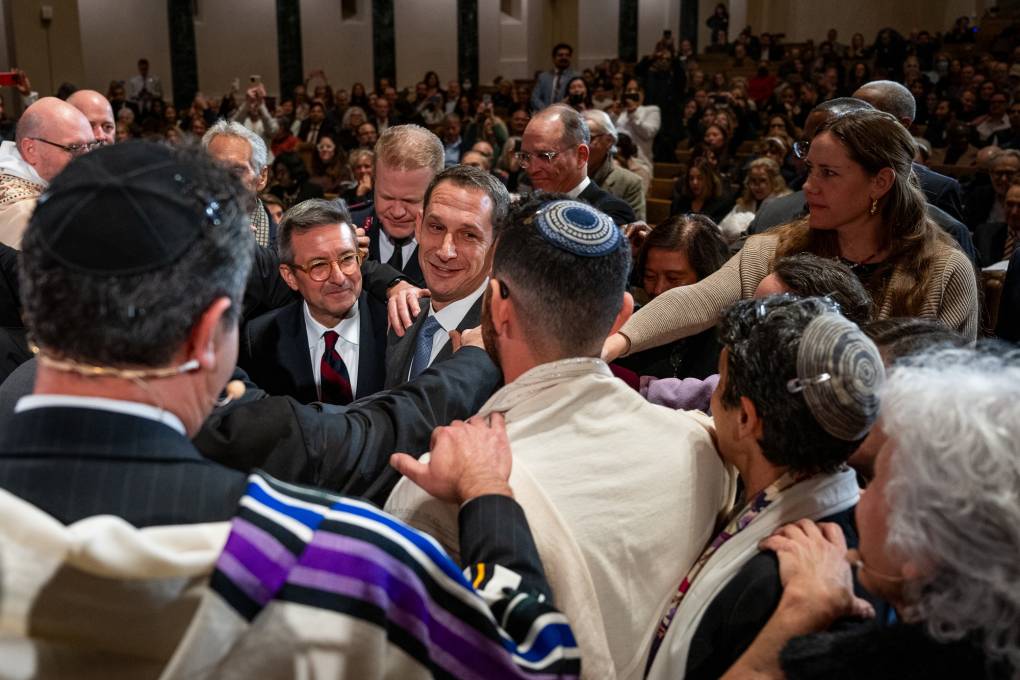Education
$7,200 for Every Student: Arizona’s Ultimate Experiment in School Choice

Tom Horne’s whole job is public education. It’s in his title — superintendent of public instruction in Arizona — where he oversees the education of 1.1 million public school students.
But in an advertising campaign this summer, Mr. Horne makes a pitch to parents who are unhappy with public school: You can choose a private school, and Arizona will help pay for it.
Mr. Horne, a Republican who won election last year promising conservative values, is overseeing a pioneering effort in Arizona to offer private school subsidies, known as school vouchers, to all students.
In a plan approved by the Republican-controlled Legislature last year, Arizona became the first state to make every student, even those from wealthy families, eligible for a school voucher — on average worth about $7,200 per student annually.
The state deposits the money into education savings accounts for parents, which can be used to pay for private school or home-schooling. If the student was enrolled in public school, the money follows the student. If the student was being privately educated, the voucher is a new cost to the state.
The program has been highly contentious — and hugely popular.
Since launching last September, it has grown from about 12,000 students to more than 59,000, outpacing projections. State education officials estimate enrollment could grow to 100,000 by next summer.
Fueled by the pandemic and an ascendant parents’ rights movement, other Republican states are moving in a similar direction. Arkansas, Florida, Iowa and Utah approved universal programs this year, and Indiana and Ohio expanded existing programs to nearly all students.
For decades, vouchers were limited to certain students: low-income children, students with disabilities, children zoned to low-performing schools. Major expansion efforts were often blocked, including by Arizona voters in 2018.
Now, advocates are finding new success with an encompassing message: parent choice for all. Every family, they say, should be able to choose a school that is right for them, and every child should have access to high-quality education.
“Nobody can do a better job of choosing what’s best for the child than the parents,” Mr. Horne said in an interview at the Department of Education, where “EMPOWER PARENTS” signs punctuate the hallways.
The message is ripe for the political moment. At a time when Americans cannot agree on much in education — from how history should be taught, to which pronouns students can use — universal vouchers seem to say: You don’t have to agree. Choose your own education adventure.
That is especially true in Arizona, a vanguard of school choice. It has the country’s largest share of charter school students and a robust home-schooling network. It created the model of education savings accounts, first used for students with disabilities in 2011 — and now expanded to all students.
Voucher supporters say Arizona is giving options to families; critics say it is sucking money from public education in a state with middling academic outcomes and low public school funding.
“The mentality is this wild, wild west, maverick-y vibe,” said Beth Lewis, director of Save Our Schools Arizona, which fought the expansion. With universal vouchers, she added, “we are at the end point of this long game.”
So far, Arizona’s program is still small — 90 percent of students attend public schools — and it has not significantly shifted public school budgets. That is in part because many students in the program were already in private schools or home schools.
But the expansion — projected to cost $376 million next school year, paid for by the state’s general fund — is already creating new demand for private schools and sending more public money to middle and upper-income families and religious schools.
The vouchers come with little accountability.
Unlike public schools, including charters, private schools and home-school parents are generally not required to administer state tests or report student outcomes.
“I’ve never seen anything that I think would fundamentally alter the nature of public education before this,” said Doug Harris, an economist at Tulane University who studies school choice. “Even charter schools, it was different. You had accountability. The students were still taking the same tests, collecting data.”
“This,” he added, “is very different.”
A New Kind of Private School
Vouchers have been a boon to parents like Ryan and Esther Brooks of Mesa, east of Phoenix.
They had taken advantage of other school choice options, sending two children to charter schools and another to a neighborhood school. But they had grown disenchanted with what they viewed as the politics of public education.
In one symbolic incident, they said, their third grader came home saying that Christopher Columbus “did some bad things.” Though they were not opposed to exploring moral complexities, the emphasis seemed off.
“That was the main thing he remembered,” said Mr. Brooks, 43.
The Brookses, who are Lutheran, enrolled in Great Hearts Christos, a new private Christian school that they hope will better fit their values. (Ms. Brooks, 30, a former teacher, used to work at an affiliated school and is optimistic about its curriculum.)
The voucher is an “essential enabler,” said Mr. Brooks, who works as an engineer while his wife stays home.
Great Hearts Christos is an offshoot of Great Hearts, a public charter school network known for its classical education and academic performance. The new venture will offer private Christian education at two schools opening next month in Phoenix and Gilbert, a nearby suburb.
With vouchers expanding, more public money will likely go toward religious schools.
In Iowa, which is launching a universal program, all but six of the state’s 183 private schools have a religious or spiritual affiliation, according to The Des Moines Register.
Rachel Laser, president of Americans United for Separation of Church and State, sees vouchers as part of a broader push by Christian conservatives, who recently won Supreme Court rulings on issues like prayer on school grounds and state money for religious schools. “It’s a very dangerous time for a foundational principle that supports our democracy, which is church-state separation,” she said.
Supporters see it another way: helping more families access the kind of education they want.
“This is a way to bring new families that never thought they could do private school,” said Daniel Scoggin, a co-founder of Great Hearts, who said the Christos schools will cater to middle- and lower-income families.
To fulfill that mission, tuition was calibrated at $9,700, just above the $7,200 voucher.
Even that relatively low price feels out of reach to many families. In the working-class neighborhood around their Phoenix location, a few hundred dollars a month can be the equivalent of “breakfast, lunch and dinner,” said Wayne Wynter, the pastor at Redemption Alhambra church, where the Christos school will be based.
Great Hearts Christos will rely on philanthropy to cover the difference for up to 100 low-income students.
Statewide, families who use vouchers tend to be relatively well off. Nearly 15,000 voucher recipients resided in ZIP codes with a median household income over $100,000, according to state data from May. Just 6,400 or so recipients lived in ZIP codes with a median household income under $50,000.
About half of students using vouchers have never been enrolled in public school — suggesting that many families were previously paying for home-schooling or private school.
Simple economics is also at play. At prestigious schools in the Phoenix area, tuition can exceed $18,000, far more than the average voucher. Even if some parents manage the difference, private schools tend to be in wealthier areas, making commuting a challenge.
Mr. Horne, the superintendent, said he wants to shift the demographics. That is one reason his department has spent hundreds of thousands of dollars advertising in English and Spanish.
“Rich people have always had the ability to choose private schools,” he said. “It shouldn’t be limited.”
The Public School Impact
Will vouchers improve Arizona students’ education?
That may be impossible to know because private school and home-schooling families are not required to submit academic data to the state. Earlier voucher research found limited academic improvement.
“My biggest single concern is the spotty evidence as to whether anybody is learning anything, because we don’t have accountability built into many of these programs,” said Chester E. Finn, Jr., a senior fellow at the Thomas B. Fordham Institute, who supports school choice but is wary of universal expansion.
Mr. Horne said that parents will deliver real-time feedback, pulling their children from private schools that do not deliver.
And he believes that giving families an offramp will drive improvements at public schools. “Competition,” he said, “is better for everyone.”
But critics, including Arizona’s largest teachers’ union, believe the money spent on vouchers is needed far more in public schools.
Adjusted for local costs, Arizona spent $10,244 per public school student in 2020 — the lowest of any state. Though state lawmakers have recently increased spending, Arizona’s funding is just catching up from cuts during the Great Recession.
Lower public school investment is not uncommon in states with voucher programs, one analysis found. Of seven states analyzed, six — including Arizona — did not keep up with national increases in per-student spending between 2008 and 2019.
Cecilia Maes, the superintendent of Alhambra Elementary School District, near Great Hearts Christos’s Phoenix location, has no shortage of ideas of what she could do with more money: Give raises to teachers. Hire a truancy officer. Stock closets with shoes, clothes and other necessities.
In her district, nearly nine in 10 students are economically disadvantaged.
“In public schools, we are committed to every child who walks through our doors, regardless of the challenges,” Dr. Maes said, echoing critics who say that children with the fewest resources and highest needs tend to be left out of the school choice frenzy.
Gov. Katie Hobbs, a Democrat who took office this year, has sought to repeal universal vouchers, but she faces an uphill battle — both in the Republican Legislature, and potentially with constituents.
Patrick Wolf, a University of Arkansas professor who studies school choice and has supported vouchers, said that expanding eligibility “pulls in a broader customer base,” which builds political support.
Steve Perez, a 38-year-old mortgage loan officer who says he is politically independent, will use vouchers to send four children to Great Hearts Christos.
“What parent wouldn’t,” he asked, “given this opportunity, choose what they believe to be a superior education if they can?”

Education
Four Fraternity Members Charged After a Pledge Is Set on Fire

Four fraternity members at San Diego State University are facing felony charges after a pledge was set on fire during a skit at a party last year, leaving him hospitalized for weeks with third-degree burns, prosecutors said Monday.
The fire happened on Feb. 17, 2024, when the Phi Kappa Psi fraternity held a large party at its house, despite being on probation, court documents show. While under probation, the fraternity was required to “demonstrate exemplary compliance with university policies,” according to the college’s guidelines.
Instead, prosecutors said, the fraternity members planned a skit during which a pledge would be set on fire.
After drinking alcohol in the presence of the fraternity president, Caden Cooper, 22, the three younger men — Christopher Serrano, 20, and Lars Larsen, 19, both pledges, and Lucas Cowling, 20 — then performed the skit, prosecutors said.
Mr. Larsen was set on fire and wounded, prosecutors said, forcing him to spend weeks in the hospital for treatment of third-degree burns covering 16 percent of his body, mostly on his legs.
The charges against Mr. Cooper, Mr. Cowling and Mr. Serrano include recklessly causing a fire with great bodily injury; conspiracy to commit an act injurious to the public; and violating the social host ordinance. If convicted of all the charges, they would face a sentence of probation up to seven years, two months in prison.
Mr. Larsen himself was charged. The San Diego County District Attorney’s office said that he, as well as Mr. Cooper and Mr. Cowling, also tried to lie to investigators in the case, deleted evidence on social media, and told other fraternity members to destroy evidence and not speak to anyone about what happened at the party.
All four men have pleaded not guilty.
Lawyers representing Mr. Cooper and Mr. Cowling did not immediately respond to messages requesting comment on Tuesday. Contact information for lawyers for Mr. Serrano and Mr. Larsen was not immediately available.
The four students were released on Monday, but the court ordered them not to participate in any fraternity parties, not to participate in any recruitment events for the fraternity, and to obey all laws, including those related to alcohol consumption.
The university said Tuesday that it would begin its own administrative investigation into the conduct of the students and the fraternity, now that the police investigation was complete.
After it confirmed the details, the dean of students office immediately put the Phi Kappa Psi chapter on interim suspension, which remains in effect, college officials confirmed on Tuesday.
Additional action was taken, but the office said it could not reveal specifics because of student privacy laws.
“The university prioritizes the health and safety of our campus community,” college officials said in a statement, “and has high expectations for how all members of the university community, including students, behave in the interest of individual and community safety and well-being.”
At least half a dozen fraternities at San Diego State University have been put on probation in the last two years, officials said.
Education
Video: Several Killed in Wisconsin School Shooting, Including Juvenile Suspect

new video loaded: Several Killed in Wisconsin School Shooting, Including Juvenile Suspect
transcript
transcript
Several Killed in Wisconsin School Shooting, Including Juvenile Suspect
The police responded to a shooting at a private Christian school in Madison, Wis., on Monday.
-
Around 10:57 a.m., our officers were responding to a call of an active shooter at the Abundant Life Christian School here in Madison. When officers arrived, they found multiple victims suffering from gunshot wounds. Officers located a juvenile who they believe was responsible for this deceased in the building. I’m feeling a little dismayed now, so close to Christmas. Every child, every person in that building is a victim and will be a victim forever. These types of trauma don’t just go away.
Recent episodes in Guns & Gun Violence
Education
Video: Biden Apologizes for U.S. Mistreatment of Native American Children

new video loaded: Biden Apologizes for U.S. Mistreatment of Native American Children
transcript
transcript
Biden Apologizes for U.S. Mistreatment of Native American Children
President Biden offered a formal apology on Friday on behalf of the U.S. government for the abuse of Native American children from the early 1800s to the late 1960s.
-
The Federal government has never, never formally apologized for what happened until today. I formally apologize. It’s long, long, long overdue. Quite frankly, there’s no excuse that this apology took 50 years to make. I know no apology can or will make up for what was lost during the darkness of the federal boarding school policy. But today, we’re finally moving forward into the light.
Recent episodes in Politics
-

 Business1 week ago
Business1 week agoThese are the top 7 issues facing the struggling restaurant industry in 2025
-

 Culture1 week ago
Culture1 week agoThe 25 worst losses in college football history, including Baylor’s 2024 entry at Colorado
-

 Sports1 week ago
Sports1 week agoThe top out-of-contract players available as free transfers: Kimmich, De Bruyne, Van Dijk…
-

 Politics6 days ago
Politics6 days agoNew Orleans attacker had 'remote detonator' for explosives in French Quarter, Biden says
-

 Politics5 days ago
Politics5 days agoCarter's judicial picks reshaped the federal bench across the country
-

 Politics4 days ago
Politics4 days agoWho Are the Recipients of the Presidential Medal of Freedom?
-

 Health3 days ago
Health3 days agoOzempic ‘microdosing’ is the new weight-loss trend: Should you try it?
-

 World1 week ago
World1 week agoIvory Coast says French troops to leave country after decades














